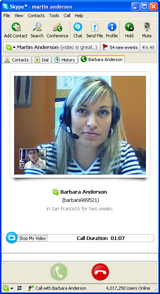Group 5: Jeff Jimenez, Mark Mason, Jessica Ottenbreit, Beatrice Ta, Douglas Zurevinski
Contents
Online Social Networking: The Advantages and Disadvantages
A social network service focuses on building communities of people who share interests and/or activities. Most social networks are web based and provide a variety of ways to interact. They are normally divided into different interest categories. For example, they include finding old classmates or blogging. We will be exploring the various advantages and disadvantages of online social networking.
History
The first social networking websites began in the mid 1990s. Online communities such as sixdegrees.com (1997) allowed people to interact on chat rooms. The name was based on the concept of six degrees of separation. It only lasted until 2001 since it was simply ahead of its time. Not enough people had open access to the internet at this time to keep the site running.
During the 2000s, the population of computer users expanded rapidly. As a result, social network sites began to flourish more in the new millennium. Founded in 2003, myspace.com has grown to a highly recognized network site. It involves creating a user submitted network of friends, blogs, groups and music for teenagers and adults.
Launched in February 2004, Facebook is another popular network site. Users can join networks based on city, school, or workplace. Mark Zuckberg founded Facebook with fellow computer science students while at Harvard University. Facebook first began for Harvard campus students to interact. It went on to include the Boston area, and eventually any student. There are more than 175 million active users. The fastest growing demographic is those 35 years of age and older. More than 3 billion minutes are spent on Facebook each day worldwide. The main difference between Myspace and Facebook is the level of profile customization. While users of MySpace can decorate their profiles, Facebook only allows plain text.
Other social network sites include: classmates.com, espinthebottle.com, flixster.com, nexopia.com and meetup.com. Social network sites for social good have begun. It allows passionate people to connect on a specific cause. For example, Idealist.org was created for people interested in non-profit causes.
Advantages
Easy Long Distance Communication
One of the advantages of online communication is being able to communicate with people over long distances. A great example of this is the program Skype. This program allows you to talk to people all around the world, and it is completely free. You are able to see the other person during the conversation so you are less likely to misinterpret what someone is saying. Also, it makes for a more personal interaction than using email or other online communication methods. Skype has additional features such as instant messaging, file transferring, and video conferences. So, it can also be used for meetings and transferring information. Skype is a fast and effective way to communicate. It has become a very useful tool for millions of people around the world whether they just want to talk or conduct meetings of more importance.
Low Cost
Online social networking has become a way to enhance communication and information, all for a very low cost. As mentioned above, Skype is an example of online social networking. It connects people from all over the world via internet in a cost effective way. There is no need to pay for long distance fees, as communicating through telephone would entail, because all that's needed is the Internet.
Most large organizations now use this online tool to boost their business and to connect its employees. Advertising online can be very cheap and sometimes more effective than other methods. This is especially true for the online networking site, Facebook. Ever since the ‘Pages’ feature was introduced, businesses and other organizations have been able advertise themselves and gain online exposure for little to no cost at all. These ‘Pages’ also appear in search engines, since the site receives so many hits, making exposure even greater.
Psychological Benefits
Whether online social networking is psychologically beneficial or harming is still up for debate. However, there are valid points to each side. Critics see these trends as leading to the demise of face-to-face interactions, widespread loneliness and alienation, and millions being lured into dangerous contact by dishonest people. However some research to date generally paints a positive picture of the Internet’s impact on people’s connections with one another. The Web offers a wealth of opportunities to interact for those normally separated because of geography, physical infirmity or social anxiety. There are also many networking sites that can help people with grave illnesses such as cancer, MS, and AIDS by providing important information, and support.(Psychology Applied to Modern Life, 06)
The following is an excerpt from Internet Psychologist Graham Jones:
Social Scientist from the University of Amsterdam claims that the Internet has "come of age" and is helping people achieve greater happiness. These days, almost every adolescent uses the Internet and they hang out together on Facebook or Bebo, for instance. This has meant that no longer are they isolated, solitary web users open to abuse by those nasty elements. Instead, they are connecting with like-minded people of their own age - often extending existing offline relationships using online technology. Interestingly, though, the researchers in the Netherlands have noticed that this has increased the way in which people engage with each other. Online, people tend to be more open and less distracted by sights and sounds that would annoy them in the "real world". This appears to enable shy people, in particular, to be more expressive and more focused on what they are doing. The result is that relationships that are either built online or enhanced via sites such as Facebook are stronger. Relationships that are carried out online appear to be deeper and more intimate than those that are just offline. And, according to the Dutch researchers, this leads to greater psychological well-being, such as increased happiness.
Disadvantages
Identity Theft
A negative side to online social networking is impersonation. This happens when identity thieves steal personal information from a user, and either exploits the user’s identity or commits fraud with it. Anyone with access to even the most basic information of a user can commit this crime. Social networking sites often assure privacy and security, but the reality is that some of these sites share users’ personal information without their consent. Facebook’s Terms of Use as of July 29, 2008 allow for information sharing of users to third parties without explicitly asking the users. This can very easily lead to issues of identity theft.
“Phishing” is a common type of scam combined with identity theft that online users may face. It is a term used when crooks send emails that appear to be from legitimate companies (such as banks) and ask for personal information. Victims respond, believing the email is real, and give their personal information and passwords. This is a very easy way for identity thieves to impersonate the user and if dealing with banks, make transfers on their accounts.
Scams
There is an implied sense of trust on social network websites. As well, there is no sense of being physically harmed. Scammers are taking advantage of this by tricking users. The four major types of scams are:
1. Downloading Malware: One technique of running social networking sites is downloading applications. This allows for scam artists to add viruses that members unknowingly download. Networking sites are most vulnerable for scams.
2. False Identity: Scammers can use the identities of genuine people, using information and photos from the Internet. In a Vegas conference, two experts did just that to set up a LinkedIn profile. It gathered 50 friends in 24 hours.
3. Hacking: Scammers only require a username and password. They can do anything from drawing graffiti on wall to invisible codes for malicious purposes.
4. Spam: Unwanted mail.
Below are various examples of scams:
Nigerian Fee 419 Scam
The 419 scam originated in the 1980s. Several unemployed students developed the scam as a quick way to make money. An advance fee fraud involves a target group being persuaded to give large amounts of money in the hope of a larger gain. This fraud grosses hundreds of millions of dollars annually. The Nigerian Fee 419 Scams target group are small and medium sized charities. The company receives a letter from someone who claims to work for the Nigerian Central Bank or government.
In the letter, the worker informs the company that he is looking for a foreign company to deposit millions of dollars of excess money into their account. After becoming confident of the letter, the victim is then pressured into submitting large sums of money to save the venture for a long period of time.
Koobface Virus
The virus name created from a spin-off of word Facebook, it infects your PC. It begins to send messages and wall postings to friends on Facebook account, directing them to a funny video link. To prevent this virus, it is advised not to open any unexpected attachments, even if they are from a friend.
Widget Warrior
Facebook has third party applications users can add onto their accounts. However, some applications have been known to steal data. For example, Secret Crush was developed in 2008 as a way to find virtual admirers. Instead, it installed spyware on the user’s computer.
Online Bullying
There are alarming factors in social networking such as cyber bullying. Examples include various cases of suicides and homicides, ability to send anonymous threats, social and emotional degradation, online sexual predators and even websites that promote death and suicide. Some examples: Megan Meier, 13, of Missouri, hung herself in 2006 due to bullying. December 2004, Japanese Internet Cults emerge, 26 dead within 2 months. Copy Cat Internet Suicides led to 17 dead between the ages of 17-27 in Bridgend, Wales. In Florida, November 21 2008, Abraham Biggs commits suicide online due to drug overdose, viewers egged him on, and only some pleaded for him not to do it.
Bullying is a serious problem, especially when childish teasing turns into serious anonymous threats. A Liberal MP from Vancouver has targeted cyberbullying, wanting to amend the Criminal Code to target children and teenagers who use any sort of Technological Social Networking to bully. 48 States in the US have already gained access to service providers to expose the identity of the harasser, if deemed necessary by a judge.
Employment
One of the disadvantages of online communications is that it makes it harder for people to become employed. It is becoming a common practice for businesses to check sites such as Facebook to look at what future employees have been up to and judging them by what they see on the sites. A good example of this is careerbuilders.com. They found that 20% of employers surveyed admitted to checking social networking pages before thinking about hiring someone. 33% of the time they decided not to hire someone based on what they saw.
A great example of how this has actually affected people is a Fortune 500 recruiter. He had 2 candidates to fill a job and the recruiter checked social networking sites for both people. On one of the candidates site he found a picture of her in a bikini. Under the heading sex, it was written yes please. Needless to say this person did not get the job. It is becoming harder and harder to get a job these days. To ensure that you are not unfairly evaluated by what employers see on these sites it would be a wise decision to either make private whatever you have on these sites or to just avoid them all together.
Physical Effects
With people spending more time on their computers and talking to others online, less time is spent interacting with friends outside of their computer monitor. The increased amount of time spent on the computer leads to a decrease in face-to-face contact that one spends with their colleagues and peers. This in turn causes an increase in social isolation. Due to the distraction that people have to interact online via online social networking, they may spend more hours online, instead of getting to sleep at a decent time. The distraction of online social networking can lead to unnatural sleeping habits which can affect day to day activities.
UCLA School of Medicine did research on the effect that social isolation has on the biological and chemical composition of the body. Their research reported that increased levels of social isolation affect the level that genes are active in white blood cells. People that were reported with high levels of social isolation had 78 genes that were more active and 131 genes that were less active than in people with low levels of social isolation. The genes that were less active were reported to include genes that were involved in the body’s response to stress and illness, and the genes that were more active were reported to include genes that were involved in promoting inflammation during stress and illness. This leads to the conclusion that online social networking can increase one's amount of social isolation, and increase their chance of developing health risks.
Another study involving the effects of social isolation was done on women that had breast cancer. This study found that women with more social activity and less social isolation had "stronger stimulated TNF-alpha responses." TNF-alpha is a compound that is produced by the immune-system cells and is associated with tumor regression and an increase in survival time for cancer patients. An increase in online social networking and a decrease in face-to-face contact can lead to serious health risks.
From spending large amounts of time on the computer, for example, when communicating with others via online social networking, one may find that they begin to develop aches and pains through out their body. A study was done, called the Neck and Upper Extremity Disorders Among Technical Assistants (NU-DATA), to examine the relationship between computer use and neck and upper extremity disorders. A large group was surveyed on questions about whether or not they felt numbness or aches and pains in the areas that they were examining. The same group of people were surveyed the following year to see whether or not any of these signs of pain had developed. When comparing the group of people from one year to the other, they discovered that more and more people had begun to feel a tingling and/or numbness in their hand(s), which is an initial sign of the development of carpal tunnel syndrome. This study reported that carpal tunnel syndrome is more closely related to mouse use, rather than keyboard use. Tingling and numbness started to become a risk factor when one runs a total of twenty hours or more in a week of mouse work. Carpal tunnel syndrome is directly related to the increase that one uses the computer, which can then be associated with online social networking.
Resources
Jessica
1. http://gigaom.com/2008/01/20/social-networks-from-the-80s-to-the-00s/
2. http://jcmc.indiana.edu/vol13/issue1/boyd.ellison.html
3. http://www.facebook.com/press/info.php?statistics
4. http://www.guardian.co.uk/technology/2007/jul/25/media.newmedia
5. http://www.caslon.com.au/socialspacesprofile2.htm
6. http://www.networkworld.com/news/2009/022709-five-facebook-scams-protect-your.html?page=2
7. http://www.scambusters.org/socialnetworking.html
8. http://en.wikipedia.org/wiki/Advance_fee_fraud
9. http://www.computerquestionhelp.com
10. http://news.cnet.com/koobface-virus-hits-facebook/
Doug
11. http://www.associatedcontent.com/article/61351/social_networking_can_be_perilous_to.html?cat=31
12. http://papers.ssrn.com/sol3/papers.cfm?abstract_id=725918
13. http://www.marketingvox.com/social-networking-grows-93-communication-becomes-entertainment-043715/
15. http://skypejournal.com/blog/2007/12/the_skype_social_network_three.html
16. http://blog.tmcnet.com/blog/tom-keating/skype/skype-could-trump-facebook-in-social-networking.asp
17. http://nmc.org/communication/
18. http://www.bnet.com/2422-13723_23-215440.html
19. http://jcmc.indiana.edu/vol12/issue4/ellison.html
20. http://gigaom.com/2006/10/09/the-future-of-social-networks-communication/
Jeff
21. http://www.wilkesbeacon.com/news/online-social-networking-benefits-youth-study-says-1.826458
22. http://news.bbc.co.uk/1/hi/uk/7898510.stm
23. http://news.bbc.co.uk/1/hi/uk/7898510.stm
24. http://psychcentral.com/blog/archives/2009/02/19/social-networking-harms-health-lol/
25. http://www.cnn.com/2005/US/Careers/03/31/online.networking/
26. http://www.microsoft.com/canada/home/safety-and-security/articles/learn-about-online-bullying.aspx
27. http://www.telegraph.co.uk/news/worldnews/1569949/Girl-13-commits-suicide-after-online-bullying.html
28. http://www.foxnews.com/story/0,2933,356056,00.html
29. http://news.bbc.co.uk/2/hi/programmes/newsnight/4071805.stm
30. http://www.timesonline.co.uk/tol/news/uk/article3399528.ece
31. http://www.nbc15.com/morningshow/headlines/27172859.html
32. http://www.cyberbullying.us
33. http://www.cyberbullying.org
35. http://www.drphil.com/slideshows/slideshow/4199/?id=4199&showID=1003
Beatrice
36. http://www.immediatecarebusiness.com/articles/urgent-care-social-networking.html
37. http://business-writing.suite101.com/article.cfm/how_to_use_facebook_pages_for_business
38. http://ezinearticles.com/?Low-to-No-Cost-Online-Advertising&id=120420
39. http://www.cippic.ca/social-networking/
40. http://www.everyday-wisdom.com/social-networking.html
41. http://www.canada.com/topics/technology/story.html?id=4de4e688-4f59-4fcc-8912-a933a2dc976d
42. http://www.danah.org/papers/FacebookAndPrivacy.html
43. http://www.pc1news.com/news/0423/social-networking-sites-could-be-identity-theft-traps.html
44. http://creditidentitysafe.com/prevention/identity-theft-social-networking-websites.htm
45. http://www.publicsafety.gc.ca/prg/le/bs/phish-en.asp
Mark
50. http://idw-online.de/pages/en/news185332
51. http://www.aafp.org/afp/20040201/tips/9.html
52. http://www.cfpc.ca/English/cfpc/programs/patient%20education/carpal/default.asp?s=1
53. http://www.medicinenet.com/carpal_tunnel_syndrome/article.htm
54. http://www.sciencedaily.com/releases/2009/03/090323212019.htm
55. http://www.carpaltunnelfreereport.com
56. Psychology Applied to Modern Life Written by Wayne Weiten, Margaret A. Lloyd, Dana S. Dunn, and Elizabeth Yost Hammer, Pulished by Michele Sordi





